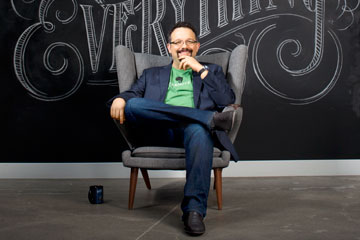
Phil Libin, CEO of Evernote, says the companys mission is to make information available everywhere all the time.
(4 of 4)
Evernote's numbers aren't stratospheric enough to make it one of the Web's behemoths. Enormous profits will come only if it signs up lots more paying customers. How large it can grow remains to be seen. But Sequoia Capital's Roelof Botha, who sits on the company's board, says its long-term potential reminds him of past Sequoia blockbusters LinkedIn and PayPal. "The thing that really surprises you in the long run," he argues, "is the upside of the winners.
Long Game
Libin has grown more obsessive about preserving Evernote's corporate culture as the business has grown to employ 330 people. "The product is the product," he says. "The culture is the next hundred products." To that end, the company offers benefits ranging from a $250-per-month stipend toward the purchase or lease of an electric vehicle to covering the cost of housecleaning services. "What we strive for is to eliminate various stupid things in modern life but also to instill a sense of what we're about," says VP of marketing Andrew Sinkov. In other words, working at Evernote is not unlike using Evernote.
In 2011, Libin floated the possibility of going public by the end of 2013. That has been pushed off for a few years. Libin is also leery of how an IPO might change the company. "Going public is not a goal," he says. "It's not an exit. It's a step on the road to being a 100-year startup."
In the meantime, executives plan to keep evolving the service. "We all have dozens of little moments a day where we could be better prepared," says Mark Ayzenshtat, a former Google engineer whose title--VP of augmented intelligence--conveys the company's desire to help make people smarter. He says future versions of Evernote will "situationally prepare you for what you're about to do. If I met you two years ago and got your business card, it should show it to me."
Libin's 100-year plan can sometimes sound like attention seeking. But Evernote's very nature implies that the firm intends to be around for the long haul. After all, if Evernote tells users to treat it as an extension of their brain, their data has to be there when they need it--whether that moment comes in two weeks or 20 years.
Libin thinks Evernote and software in general are on the cusp of morphing into distributed services built into glasses, watches, refrigerators and cars, with every version working seamlessly in concert. That may come to pass, but the truth is that few technology companies have survived one such revolution.
If Libin is intimidated, he hides it well. "It's supercool to be in an industry that's on the very edge of that sort of apocalyptic change," he says, musing on Evernote's future. "You roll up your sleeves and say, 'Someone will figure this out, and it might as well be us.'"
